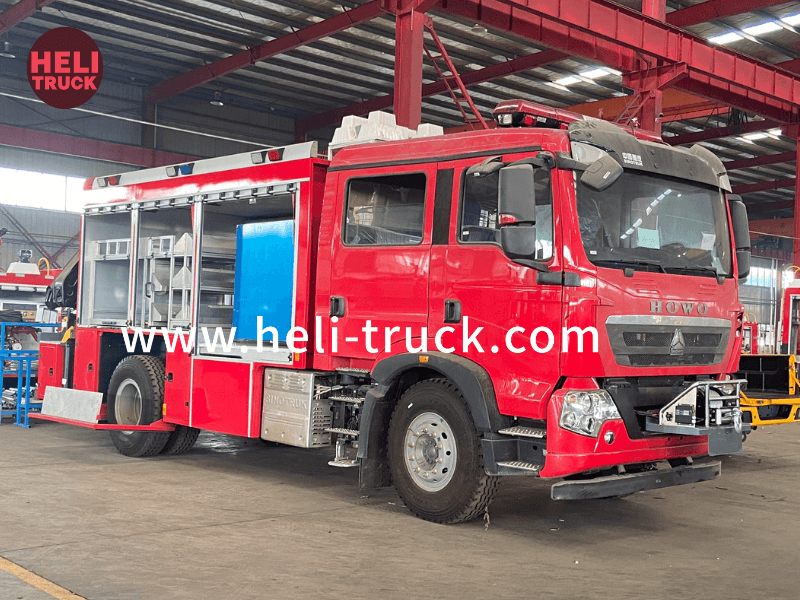Introduction
Garbage compactor trucks play a vital role in waste management systems worldwide. These specialized vehicles are designed to collect, compact, and transport solid waste efficiently, making them crucial in maintaining clean and sanitary environments. In recent years, the focus on sustainability and environmental protection has led to increasing demands for improved waste sorting processes. Garbage compactor trucks equipped with advanced technology are now at the forefront of these efforts, enabling more efficient waste collection and recycling practices. This article aims to explore the functions, types, benefits, and future trends of garbage compactor trucks for waste sorting.
Functions of Garbage Compactor Trucks
Garbage compactor trucks are essential tools for waste management operations, offering a range of functions that streamline the collection and disposal process. These functions include:
1. Collection: Garbage compactor trucks are primarily used for collecting solid waste from residential, commercial, and industrial areas. Equipped with a loading mechanism, these trucks can efficiently pick up garbage bins and containers from various locations.
2. Compaction: One of the key features of garbage compactor trucks is their ability to compact solid waste. By compressing the collected waste, these trucks can maximize their carrying capacity, reducing the frequency of trips to disposal sites and minimizing transportation costs.
3. Transportation: Once the waste is compacted, garbage compactor trucks transport it to designated disposal facilities such as landfills, recycling centers, or waste-to-energy plants. The transportation process is crucial for ensuring the proper management and disposal of solid waste.
4. Waste Sorting: Advanced garbage compactor trucks are equipped with sorting mechanisms that help separate recyclable materials from general waste. This feature promotes recycling and resource recovery, contributing to sustainable waste management practices.
Types of Garbage Compactor Trucks
Garbage compactor trucks come in various types and configurations to suit different waste management needs. Some of the common types of compactor trucks include:
1. Rear Loader Compactor Trucks: Rear loader compactor trucks are equipped with a loading mechanism at the rear of the vehicle. This design allows workers to collect and load waste bins from residential areas efficiently. Once the waste is loaded, the compaction process begins, maximizing the truck's capacity.
2. Front Loader Compactor Trucks: Front loader compactor trucks feature a loading mechanism at the front of the vehicle, making them ideal for collecting waste from commercial and industrial establishments. These trucks are commonly used for collecting large dumpsters and containers.
3. Side Loader Compactor Trucks: Side loader compactor trucks are equipped with a loading mechanism on the side of the vehicle, enabling workers to collect waste from narrow streets and alleys. This type of compactor truck is commonly used in urban areas with limited access to waste collection points.
4. Roll-Off Compactor Trucks: Roll-off compactor trucks are designed to transport large containers or compactors to and from waste disposal sites. These trucks are versatile and can handle a wide range of waste materials, making them suitable for construction and demolition debris.
Benefits of Garbage Compactor Trucks for Waste Sorting

Garbage compactor trucks offer a range of benefits for waste sorting and management, making them indispensable tools in the industry. Some of the key benefits of using compactor trucks include:
1. Increased Efficiency: Garbage compactor trucks are designed to streamline the waste collection process, reducing the time and labor required for waste management operations. By compacting waste on-site, these trucks can carry larger loads and make fewer trips to disposal sites, leading to cost savings and increased efficiency.
2. Improved Hygiene: The enclosed design of garbage compactor trucks helps contain odors and prevent littering during transportation. This feature is crucial for maintaining hygiene standards and ensuring the health and safety of waste management workers and the general public.
3. Environmental Benefits: Garbage compactor trucks play a vital role in promoting environmental sustainability by facilitating waste sorting and recycling practices. By separating recyclable materials from general waste, these trucks help reduce the amount of waste sent to landfills, conserving natural resources and reducing greenhouse gas emissions.
4. Versatility: Garbage compactor trucks come in various types and sizes to suit different waste management needs. Whether collecting household waste, commercial waste, or construction debris, compactor trucks offer versatility and adaptability to diverse waste streams.
Future Trends in Garbage Compactor Trucks
As the demand for sustainable waste management solutions continues to grow, the future of garbage compactor trucks is poised for innovation and advancement. Some of the emerging trends in compactor truck technology include:
1. Smart Waste Management Systems: Garbage compactor trucks are increasingly being equipped with smart sensors and monitoring devices to optimize waste collection routes and schedules. Garbage Compactor Truck automation technology enable real-time tracking of waste volumes and collection points, allowing for more efficient and data-driven waste management practices.
2. Electric-Powered Compactor Trucks: With a focus on reducing carbon emissions and promoting clean energy solutions, electric-powered compactor trucks are gaining popularity in the industry. These vehicles offer lower operating costs and reduced environmental impact compared to traditional diesel-powered trucks.
3. Automated Waste Sorting: Advanced garbage compactor trucks are incorporating automated sorting technologies to segregate recyclable materials from general waste during the collection process. This automation enhances the efficiency of waste sorting operations and promotes recycling initiatives.
4. Integration of Robotics and AI: The integration of robotics and artificial intelligence (AI) in garbage compactor trucks is revolutionizing waste management processes. Robots and AI algorithms can assist in waste sorting, compaction, and transportation, increasing operational efficiency and reducing human labor requirements.
Conclusion
Garbage compactor trucks are indispensable assets in waste management systems, offering efficient and sustainable solutions for waste collection and sorting. With advanced technology and innovative designs, these trucks are driving the evolution of waste management practices towards greater sustainability and environmental protection. By embracing the functions, types, benefits, and future trends of garbage compactor trucks, communities and industries can achieve more effective waste management strategies and contribute to a cleaner and healthier environment for future generations.
